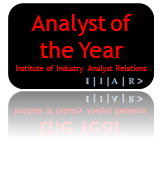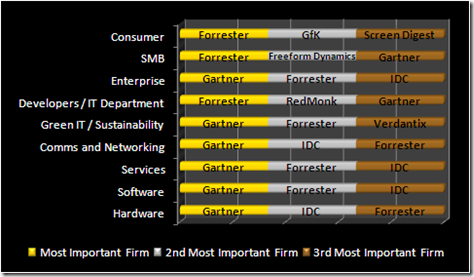Analyst of the year 2009 (part 1)
 In a year where analysts have had to prove their worth to fight back against the reduction in discretionary spend, we would like to applaud those companies and individuals who have shown a commitment to providing a service that goes above and beyond what is expected.
In a year where analysts have had to prove their worth to fight back against the reduction in discretionary spend, we would like to applaud those companies and individuals who have shown a commitment to providing a service that goes above and beyond what is expected.
This series of blog posts will showcase the results of the recent ‘Analyst of the Year Survey’. The results of this survey were collated over a three month period during which time 137 AR pros responded to a questionnaire available on surveymonkey.
In case you are wondering, the highest accolade of “Analyst of the Year” and “Analyst Firm of the Year” will be announced in the second post in this series.
Results (part 1)
Most Important Analyst House
Most Important Analysts
*NB. Not enough data was collected on “important consumer analysts” to make the results confident.
Opinion on Firm Importance
Note – this post refers to ‘importance’ NOT analyst of the year which will be covered in the next post.
When I compare the results from last year there seems to be a significant trend to the larger international houses. Gartner, Forrester and IDC seem to haul in the majority of opinions as to which firm is the most important.
Perhaps it is of little surprise that firms are cutting back and focusing on the analyst houses that have the greatest global reach. However, it is somewhat refreshing that other houses also are listed and have managed to carve out their own niches – notably: Verdantix and Quocirca in the green IT space and RedMonk and MWD in the developer/ IT Pro sector. It is in these smaller, areas where ‘boutique’ firms have managed to push their own USP and become sector leaders. Whether this was by choice or accident, I don’t mind but perhaps this is a new trend that we should monitor.
It is also worth giving a special mention to both AMR and Ovum who between them seemed to just miss out as they both made a high number of 4th places.
Opinion on Analyst Importance
There is a partial correlation between analyst house importance and analyst importance with a few significant exceptions. Most notably where people attach more importance on the individual rather than the company. This could be because of the bespoke value they give to firms and their unique intelligence and insight.
Notable analysts who fall into this category include David Mitchell from Ovum, Ray Wang from Forrester and James Governor from RedMonk.
David Mitchell, commenting on the results said:
Being recognized by your customers is always an honour, especially when the recognition comes from the IIAR and its members. Being recognized in enterprise, software, and services is especially gratifying.
European excellence
Even though the IIAR is based in the UK, the fact that new chapters are opening up around the world is testament to the fact that this survey was truly global in its reach. At first analysis, I was immediately concerned over the relatively high number of awards that have gone to EMEA-based analysts and firms thinking that this was due to the physical location of the voters.
However, 72% of all respondents were based in the US or Canada.
As to why the Europeans tend to so well…
My personal view is that whereas a great deal of syndicated research tends to get created and published from the US, the European analysts have to rely on their revenue stream coming from their local market knowledge, deep messaging insights and customer focus. To put it bluntly, they need to prove value otherwise they will be out of a job. This point may well be the most contentious and I am happy to discuss this point further.
Given that there are NO US boutique analysts that appear in the "most important" list, perhaps the question that should be raised is “what gives European based analysts this reputation in the US but not vice versa?”
What factors make someone pick a firm or individual as important
Brand, sales coverage and processes (to ensure the quality, independence and exhaustiveness of the research) are universally important. So is the impact that an analyst firm has on deals.
Individual traits include: bringing unique insights to the table, being easy to deal with, delivering value to end users and vendors with each interaction, and understand user needs whilst providing tangible real world benefits.
In the second of this series of blog posts, the coveted “Analyst of the Year” and “Analyst Firm of the Year” will be announced.
Methodology
1) Entrants:
This survey was open to anyone who works in analyst relations in any country, either in-house or at an agency/consultancy. In order for someone’s entry to be validated, they had to submit their email address and company name to verify they not an impostor trying to distort the results. This personal information will not be distributed or used beyond sending copies of the results to all participant. The survey was open for specific period of time and IP addresses were taken to ensure that someone could not vote twice.
2) Questions:
The survey specifically focused on an individual’s perception of the analyst world. A full list of every analyst house was made available for respondents to select their preference.
3) Segmentation:
Respondents were asked to specify their submissions based upon geography and segment. Based upon these criteria further analysis could be made of the results to identify specific regional or segment champions.
If you have any questions or comments about this survey please contact me (@jonnybentwood)
This post is also published on the Institute of Industry Analyst Relations (IIAR) blog and The Naked Pheasant.
Filed under: analyst relations | 2 Comments
Tags: analyst relations




 RSS feed
RSS feed
What a load of pretentious euro-centric crap. Sorry, but you have missed off many analysts who are widely considered far more knowledgeable and experienced. Idc, for one, has zero influence with users, or user clients, so you should discount them immediately. You also miss off other respected analyst firms in the US, namely current analysis, strategy analytics, amr, yankee, input etc etc.
Thanks for your comment David. In conducting this survey, I have ensured that anyone could vote for any firm they wished without bias. I agree that many of the firms you have listed are very good but unfortunately they did not receive enough votes to make it into the top 3 for any of the categories listed.
Finally I would also argue that even though end user influence is important it is often not the be all and end all. Smaller boutiques such as MWD and large internationals like IDC who have little (to none) end user influence can still provide tremendous value to vendors regardless.